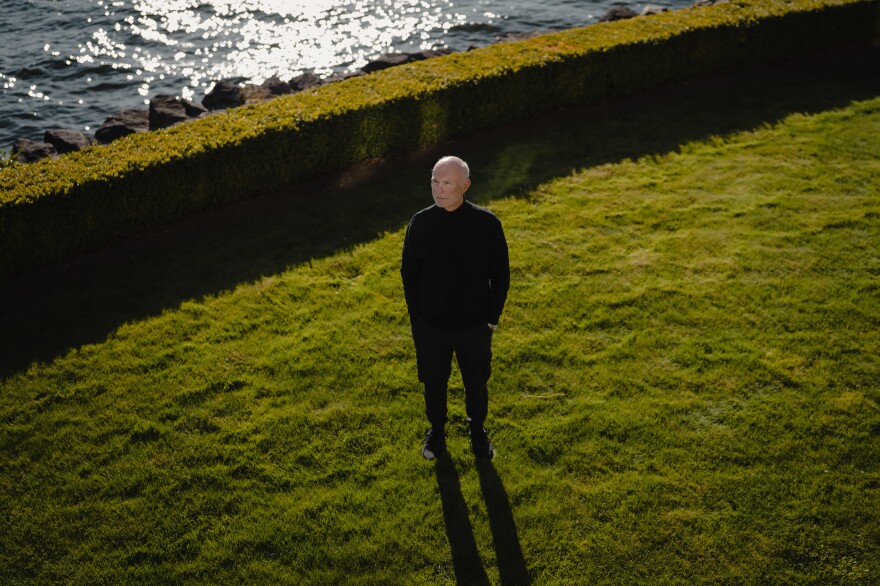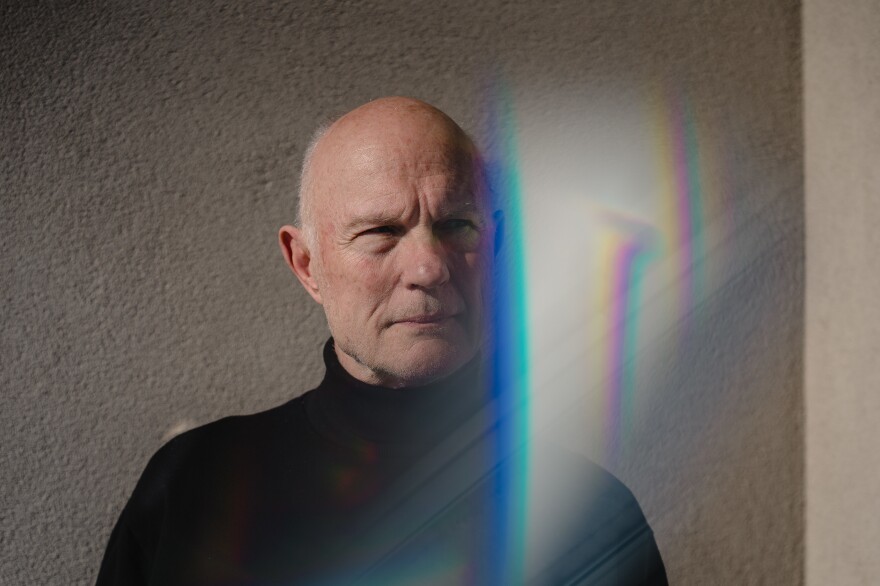Updated February 22, 2023 at 11:38 AM ET
The law that governs the internet could be in for its first-ever rewrite, potentially making tech companies legally responsible for what users post or what recommendation engines suggest.
The U.S. Supreme Court heard oral arguments in a case Tuesday, and a second case is before the court on Wednesday, taking square aim at a law known as Section 230.
It gives internet platforms a legal shield that tech companies have benefited from since 1996. The law essentially allowed the internet to blossom in its early days without being bogged down with pesky lawsuits, supporters say. It also allowed tech companies to decide what is allowed and what isn't on their own sites, without being on the hook legally for every single thing a user posts.
But detractors of Section 230 counter that it gave social media companies a free pass in the face of the rise of hateful content, disinformation, or content that moves people into radical corners of the internet.
If the court decides to weaken this legal immunity, internet companies, especially social media platforms, could face a flood of lawsuits over what users post on Instagram, Facebook, YouTube, TikTok, Twitter and other sites.
Vast swaths of the internet that rely on user-generated content, like Wikipedia, Yelp, Amazon, Substack, Glassdoor, and even comments sections, could be radically reshaped, and see new levels of censorship, since all content could become the basis for legal action.
How has the internet been ruled by by this law for the past 27 years? It all traces back to a man named Ken Zeran who launched a war against AOL in the mid-1990s after he became the target of a nasty harassment campaign.
Here is Zeran's story.
(Editor's note: this was first published and broadcast in 2021)
'Ask for Ken' posting led to a nightmare for Ken Zeran
In April 1995, Ken Zeran's phone started ringing. And ringing. And ringing.
"Lots of calls. It wasn't like every second. But it was just lots of calls," Zeran said in an interview with NPR.
He ran a real estate magazine in Seattle. But his phone ringing off the hook had nothing to do with that — these callers were irate, often screaming.
"'How could you do this? What a loser you are,'" he remembers them saying. "You can use your own sense and think of what they might be saying given what had just happened in Oklahoma City."
What had just happened in Oklahoma City was a domestic terrorist attack at a federal building that left 168 people dead and rattled the nation.
Unbeknownst to Zeran, an Internet troll fired up a dial-up modem and posted a message to America Online, now AOL, under the username "Zen ZZ03." They hawked T-shirts emblazoned with offensive messages like "Visit Oklahoma ... It's a BLAST!!!," and other tasteless messages about the victims. The ad directed readers to call Zeran, offering the number to his home office in Seattle.
"Ask for Ken," the ads read. "Due to high demand please call back if busy."
Zeran wanted these ads removed. He got on the phone with AOL.
"And basically I told them, my phone's ringing off the hook. And I can't get anything done, and it's all these people upset about something they saw on AOL," he said.
It took a day, but AOL did delete the post. Yet more popped up. AOL was slow to respond. Meanwhile, Zeran continued to be bombarded with calls, about one call every two minutes during the worst of it.
His business ground to a halt. He was sleepless for days and was emotionally drained.

He talked to AOL's legal department, the FBI, the Secret Service. Nonetheless, the calls persisted. Zeran went from being frazzled to worried for his safety.
"I didn't want the things to go any further and have some nitwit show up with a shotgun on my property," he said. "The problem was AOL would not post something on their server telling their audience that this is a bunch of baloney, a hoax or whatever. And so the calls kept coming."
This predicament launched a battle between Zeran and AOL that would end up making history and would lay the legal foundation for the Internet of today.
Facebook, Google, Amazon, Yelp, Wikipedia and countless other social media, e-commerce and discussion sites that rely on user-generated content could not exist without the precedent that emerged from Zeran's case.
And some experts blame the growth of the most pernicious content — disinformation, hate, bullying, harassment — on the how the court viewed Zeran's fight with AOL.
'The most important Internet law ruling ever'
In his lawsuit, Zeran's lawyers wrote that AOL, in operating a "computer bulletin board," that was put on notice about a defamatory and incendiary post and did not act fast enough to remove it, was liable. Therefore, his attorney's argued, AOL should pay monetary damages to Zeran.
Two months before Zeran's suit, Congress had enacted the Communications Decency Act of 1996, a mostly anti-porn law that the Supreme Court would later strike down on First Amendment grounds. The law contained something else, though: a provision now best known as Section 230.
At the time of its drafting, lawmakers were afraid that if websites got into the business of removing harmful content, they would be considered publishers, rather than simply distributors, under the law. That could expose this nascent industry to a flood of defamation lawsuits.
To fix what's become known as "the moderator's dilemma," Section 230 did two things. First, it said websites cannot be sued for what users post. Second, it let companies dictate what would be allowed on, and what would be taken down from, their websites. Enforcing those rules would be up to the companies.
But just how sweeping was this law?
Before Zeran, it was hard to say. The 26 words of Section 230 that give "interactive computer services" immunity were inscrutable. Debate raged about how broad or narrow the words should be seen.
But when the U.S. Court of Appeals for the 4th Circuit issued its opinion in Zeran's case, it strongly favored AOL, expanding and strengthening the law and leaving little doubt about just how powerful this legal shield is.
"Congress recognized the threat that tort-based lawsuits pose to freedom of speech in the new and burgeoning Internet medium," the court wrote. "The imposition of tort liability on service providers for the communications of others represented, [is] for Congress, simply another form of intrusive government regulation of speech."
With that ruling, tech companies no longer had to fear getting sued for something users posted, even if the online service was put on notice about defamatory content. It helped propel tech startups into multi-trillion-dollar global behemoths. Scholars call the Zeran decision "the most important Internet law ruling ever."
"They took this really exceptionalist view by saying Congress wanted to treat the Internet differently than other media and provide this strong protection in an effort to encourage innovation and speech on the internet," said lawyer Jeff Kosseff, who's written a book all about Section 230.
A review of federal court decisions by NPR shows that the Zeran case has been cited by judges 350 times, a number that scholars say is likely a low estimate.
That's because nearly every time a digital platform is sued for hosting comment that someone sees as defamatory, the case is tossed before it can ever be heard, often with a reference to the Zeran case. There are some exceptions for child pornography, copyright infringement and a violation of federal criminal law, but the protection is otherwise just about absolute.
Congress is now considering a flurry of changes to Section 230 to hold tech companies more accountable for content that spreads on their platforms.
And last week, a federal appeals court delivered a blow to Section 230 in a case against Snap, Inc., the maker of Snapchat. The court said the law would not protect the company against a suit brought by parents of young men who died in a fatal car crash while using the app's "speed filter" feature.
While the full impact of the decision remains to be seen, it provided hope to plaintiffs' lawyers who have long been frustrated with how nearly impossible it is to take an Internet company to court.
Zeran: 'There's no putting the genie back in'
To this day, Zeran has not been able to figure out who trolled him back in the '90s and what may have motivated the cyberattack.
"My lawyers asked me hundreds of times, 'Who do you think it was?' 'Who do you think it was?' The only theory I can come up with is that my number was well known out there, and that it was just a case of random trolling," he said.
Eric Goldman, a professor at Santa Clara University Law School who has written extensively about the Zeran case, has a hard time believing that Zeran was not intentionally targeted, but he admits that the real culprit may forever be a mystery.
"I just cannot accept the idea that he was a random drive-by victim. That just doesn't pass the smell test," Goldman said. "It is one of the great whodunits of our time."
Zeran is now 74. He works in real estate in Seattle, and he's also an artist. Though he has largely moved on from this chapter of his life, he said it still bugs him that the appeals court sided against him (At the time, he appealed to the U.S. Supreme Court, but it refused to review the case).
"The judge made a huge mistake," Zeran said. "Because by removing responsibility, they created chaos."
Experts largely agree this court decision has added to online chaos, arguably making confronting harassment, disinformation and other abuse less urgent for Silicon Valley. But defenders say the law has enabled the growth of the "open Internet," and that without the court's broad interpretation of Section 230, platforms would be forced to censor loads of content for fear of litigation exposure.
Zeran, meanwhile, thinks AOL played a major part in his grief by allowing whoever posted the ads to remain anonymous. He hopes Congress pushes websites to authenticate users' real identities.
"People register their cars and they get a license," before they drive, Zeran said. "There should be a registration process for the web, too."
His nightmarish experience, he said, was a preview of the kind of trouble a nearly impenetrable legal shield for any industry could wrought.
"There's no putting the genie back in of what we have now," Zeran said. "But this is what we have, and it's not working well."
Copyright 2023 NPR. To see more, visit https://www.npr.org.



